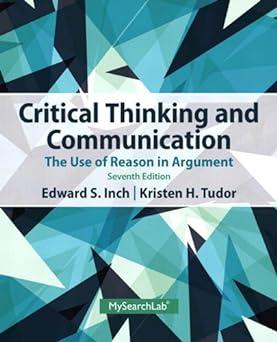2. Which advocate was stronger in terms of developing quality arguments? Why do you think so? By...
Question:
2. Which advocate was stronger in terms of developing quality arguments? Why do you think so?
By some estimates, more than 8 million people are logged into file-sharing networks around the world at any one time. With more than 900 million illegal music files available on these networks, along with movies, texts, and images, illegal file sharing is one of the single largest uses of the Internet.1 College and university students represent some of the most active participants in these networks that share illegally copied and distributed files. In response to calls from recording artists and movie studios, the U.S. Congress has worked to strengthen copyright laws and increase penalties for violators. Higher-education leaders are being asked to move quickly and aggressively to eliminate illegal peer-to-peer (P2P) sharing on their campuses.2 Senator Lamar Alexander, for instance, demanded that colleges and universities immediately “adopt policies and educational programs on their campuses to help deter and eliminate illicit copyright infringement occurring on, and encourage educational uses of, their computer systems and networks.”
3 Despite their efforts, law enforcement and campus officials have found it difficult to control because of the ease of access to the Internet and inexpensive technology.
The core of the controversy is copyright law. Copyright laws state that if a work is going to be used, the original producer must give permission for its use and, generally, the author should be compensated for it. When a song is sold on iTunes, for instance, the original recording artist receives a royalty payment for the sale. When a college or university stages a play, typically, it pays fees to the copyright holder for the use of the script.4 But technologies that provide easy ways of reproducing and distributing original works have made circumventing copyright simple. Although governments have worked to adapt laws to meet these threats, almost anyone with a computer and access to the Internet has the ability to illegally share files with others. This is why the Internet has been described as the biggest threat to copyright since the invention of the printing press.
Cathy: Pirating songs and movies is wrong and unethical. An honest person would never swap music, movies, games, or any other file without paying for them. File sharing has completely destroyed the music industry and that hurts all of us who want to purchase quality music. People no longer buy music; they rip it off. Artists have been hurt;
music stores have gone bankrupt. Pretty soon, there will be no new music because artists won’t be able to afford to live. Anyone caught pirating protected files on campus should be expelled.
Nick: The fact that people share files without paying for them is the fault of the music industry.
Record producers pack albums full of tracks that no one wants and then force you to pay excessive amounts of money for one good song buried in the middle of ten bad songs. Sites like iTunes have made it better, but even so, the music is too expensive.
Besides, file sharing gives people more choices and people discover artists they didn’t know existed. I am not saying we should rip off artists, but file sharing lets us discover new bands and it gives young artists an opportunity to be heard—and that doesn’t happen on commercial radio or television where big labels pay high premiums to get songs played over and over. File sharing gives people a choice and provides a level playing field for new artists. Expelling a student for sharing files is a little extreme, don’t you think?
Cathy: Your argument doesn’t make any sense. You are saying that new artists will be better off giving their music away so that they can be heard. But if they never make any money, how will they produce the songs in the first place? I understand that MP3 files could help promote new artists, but that is not what people download. I have read that only ten songs in a thousand were from relatively unknown artists. Besides, even if everything you say is true, nothing prevents new artists from putting up content for free. My only point is that sharing should be done with permission. We should not allow stealing, especially when there are legal, low-cost alternatives.
Nick: Copyright laws need serious updating. Sharing is not stealing. Whenever anything is released to the public, it has been shared, and once someone has paid for a book, song, movie, or anything else, why can’t they share it with whomever they choose?
That’s Michael Moore’s point. Once you buy one of his documentaries, his view is he wants people to see it. He gets paid and then you can share. Libraries pay for a book once and then allow anyone to check it out. If I buy a DVD, don’t I have the right to show it to my friends? I’m allowed to record my favorite song off the radio.
What makes sharing MP3s so different? Our copyright laws need to adapt to new technologies.
Cathy: Maybe the laws should change and maybe they are outdated. But that doesn’t matter.
File sharing is illegal. People who do it without permission are breaking the law. While the Digital Millennium Copyright Act has a fair-use provision for personal purposes, it does not allow those copies to be traded. You and I can rip a CD we bought, but when we give it away to someone else, we have broken the law.
There is no difference between sharing the track with someone else and stealing it from the store.
Step by Step Answer:

Critical Thinking And Communication The Use Of Reason In Argument
ISBN: 9780205925773
7th Edition
Authors: Edward S. Inch, Kristen H. Tudor






